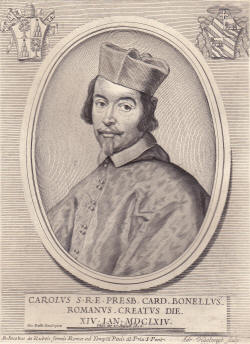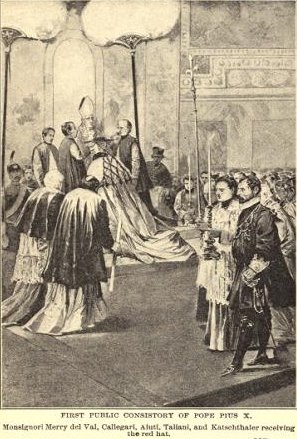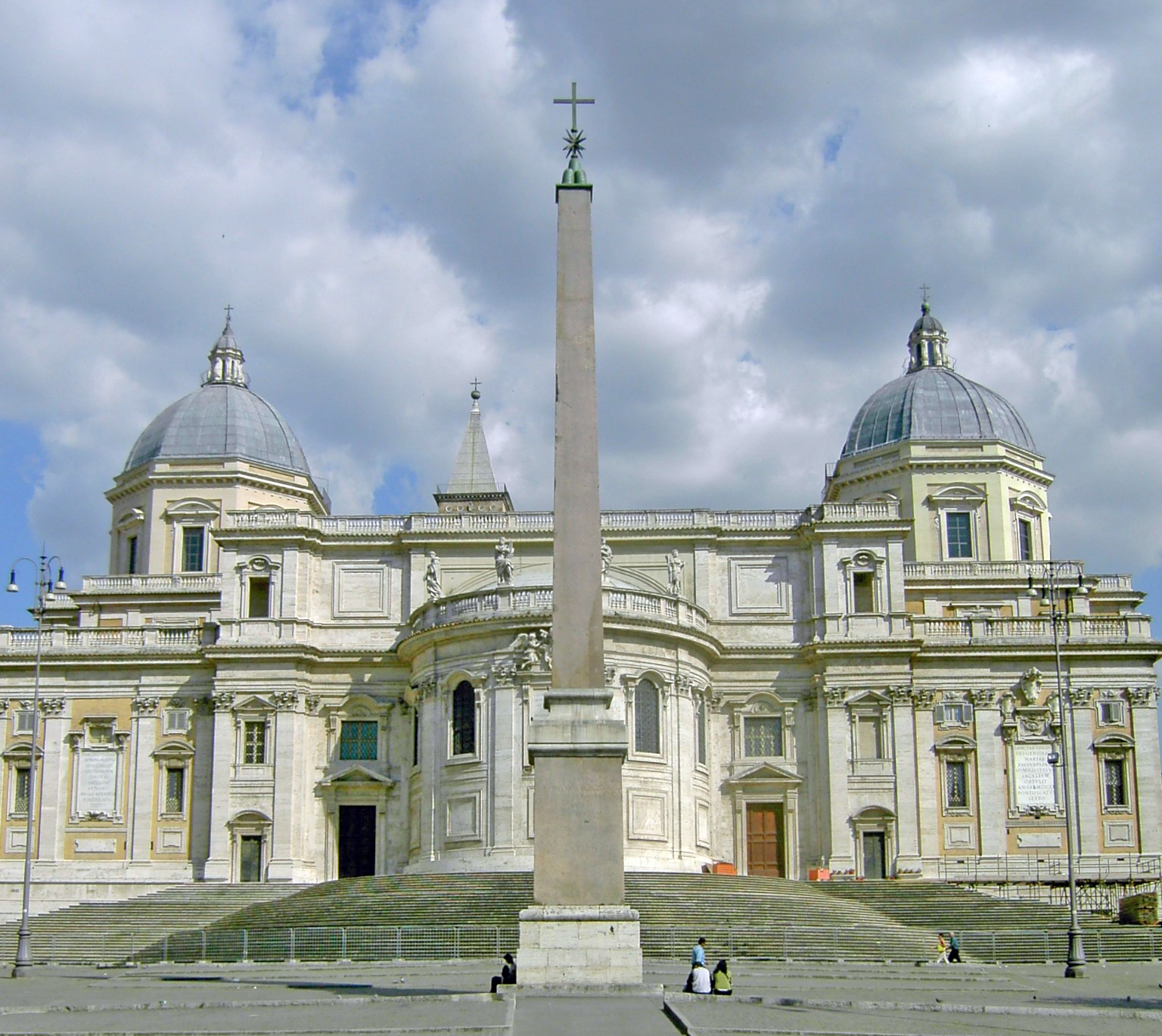|
Carlo Bonelli
Carlo Bonelli (1612–1676) was an Italian lawyer and diplomat who was appointed a cardinal of the Roman Catholic Church in 1664. Life Carlo Bonelli dei marchesi di Cassano was born in 1612, the great-great-grand-nephew of Pope Pius V. He received his doctorate in law from the University of Perugia and was appointed private chamberlain to Pope Urban VIII. His career in the Roman Curia resulted in appointments as governor of several cities of the Papal States, including Rome, then as vice-camerlengo from 15 April 1655 to 18 October 1656, when he was appointed to the titular position of Latin Archbishop of Corinth. Fortified by the title, he was sent as nuncio extraordinary to Philip IV of Spain to establish peace among the Christian princes, 27 October 1656. With the Treaty of the Pyrenees signed in 1659, he remained in Madrid as ordinary nuncio until 1664. When he was recalled to Rome and made cardinal in the consistory of 14 January 1664, with the '' titulus'' of S. Anastasi ... [...More Info...] [...Related Items...] OR: [Wikipedia] [Google] [Baidu] |
Carolus Bonellus 1664
*
{{disambiguation, genus ...
Carolus may refer to: People * Carolus (name) * the medieval Latin form of the name Charles **Charlemagne (742–814) * King Charles XII of Sweden, who is sometimes referred to as "Carolus Rex" Scientific * ''Carolus'' (plant), a genus of flowering plants in the family Malpighiaceae * ''Carolus'' (bug), a genus of insects in the family Cixiidae * 16951 Carolus Quartus, an asteroid Miscellaneous * Carolus (coin), several coins * ''Carolus'', several ships; see List of Swedish ships of the line See also * Carl (name) * Charles * Karl (other) Karl may refer to: People * Karl (given name), including a list of people and characters with the name * Karl der Große, commonly known in English as Charlemagne * Karl Marx, German philosopher and political writer * Karl of Austria, last Austria ... [...More Info...] [...Related Items...] OR: [Wikipedia] [Google] [Baidu] |
Papal Consistory
In the Roman Catholic Church a consistory is a formal meeting of the College of Cardinals called by the pope. There are two kinds of consistories, extraordinary and ordinary. An "extraordinary" consistory is held to allow the pope to consult with the entire membership of the College of Cardinals. An "ordinary" consistory is ceremonial in nature and attended by cardinals resident in Rome. For example, the pope elevates new cardinals to the College at a consistory; Pope Francis has called consistories for ceremonies of canonization. A meeting of the College of Cardinals to elect a new pope is not a consistory, but a conclave. History The term ''consistory'' comes from the la, con-sistere; "stand together".''Papal Consistory'' by Kevin Knight (Catholic Encyclopedia, 2009) Early popes conferred with their Roman presbytery which included ... [...More Info...] [...Related Items...] OR: [Wikipedia] [Google] [Baidu] |
University Of Perugia Alumni
A university () is an institution of higher (or tertiary) education and research which awards academic degrees in several academic disciplines. Universities typically offer both undergraduate and postgraduate programs. In the United States, the designation is reserved for colleges that have a graduate school. The word ''university'' is derived from the Latin ''universitas magistrorum et scholarium'', which roughly means "community of teachers and scholars". The first universities were created in Europe by Catholic Church monks. The University of Bologna (''Università di Bologna''), founded in 1088, is the first university in the sense of: *Being a high degree-awarding institute. *Having independence from the ecclesiastic schools, although conducted by both clergy and non-clergy. *Using the word ''universitas'' (which was coined at its foundation). *Issuing secular and non-secular degrees: grammar, rhetoric, logic, theology, canon law, notarial law.Hunt Janin: "The university ... [...More Info...] [...Related Items...] OR: [Wikipedia] [Google] [Baidu] |
Diplomats Of The Holy See
A diplomat (from grc, δίπλωμα; romanized ''diploma'') is a person appointed by a state or an intergovernmental institution such as the United Nations or the European Union to conduct diplomacy with one or more other states or international organizations. The main functions of diplomats are: representation and protection of the interests and nationals of the sending state; initiation and facilitation of strategic agreements; treaties and conventions; promotion of information; trade and commerce; technology; and friendly relations. Seasoned diplomats of international repute are used in international organizations (for example, the United Nations, the world's largest diplomatic forum) as well as multinational companies for their experience in management and negotiating skills. Diplomats are members of foreign services and diplomatic corps of various nations of the world. The sending state is required to get the consent of the receiving state for a person proposed to serve ... [...More Info...] [...Related Items...] OR: [Wikipedia] [Google] [Baidu] |
Cardinals Created By Pope Alexander VII
Cardinal or The Cardinal may refer to: Animals * Cardinal (bird) or Cardinalidae, a family of North and South American birds **''Cardinalis'', genus of cardinal in the family Cardinalidae **''Cardinalis cardinalis'', or northern cardinal, the common cardinal of eastern North America * ''Argynnis pandora'', a species of butterfly * Cardinal tetra, a freshwater fish * ''Paroaria'', a South American genus of birds, called red-headed cardinals or cardinal-tanagers Businesses * Cardinal Brewery, a brewery founded in 1788 by François Piller, located in Fribourg, Switzerland * Cardinal Health, a health care services company Christianity * Cardinal (Catholic Church), a senior official of the Catholic Church **Member of the College of Cardinals * Cardinal (Church of England), either of two members of the College of Minor Canons of St. Paul's Cathedral Entertainment Films * ''Cardinals'' (film), a 2017 Canadian film * ''The Cardinal'' (1936 film), a British historical drama * '' ... [...More Info...] [...Related Items...] OR: [Wikipedia] [Google] [Baidu] |
17th-century Italian Cardinals
The 17th century lasted from January 1, 1601 ( MDCI), to December 31, 1700 ( MDCC). It falls into the early modern period of Europe and in that continent (whose impact on the world was increasing) was characterized by the Baroque cultural movement, the latter part of the Spanish Golden Age, the Dutch Golden Age, the French ''Grand Siècle'' dominated by Louis XIV, the Scientific Revolution, the world's first public company and megacorporation known as the Dutch East India Company, and according to some historians, the General Crisis. From the mid-17th century, European politics were increasingly dominated by the Kingdom of France of Louis XIV, where royal power was solidified domestically in the civil war of the Fronde. The semi-feudal territorial French nobility was weakened and subjugated to the power of an absolute monarchy through the reinvention of the Palace of Versailles from a hunting lodge to a gilded prison, in which a greatly expanded royal court could be more easily k ... [...More Info...] [...Related Items...] OR: [Wikipedia] [Google] [Baidu] |
1676 Deaths
Events January–March * January 29 – Feodor III becomes Tsar of Russia. * January 31 – Universidad de San Carlos de Guatemala, the oldest institution of higher education in Central America, is founded. * January – Six months into King Philip's War, Metacomet (King Philip), leader of the Algonquian tribe known as the Wampanoag, travels westward to the Mohawk nation, seeking an alliance with the Mohawks against the English colonists of New England; his efforts in creating such an alliance are a failure. * February 10 – After the Nipmuc tribe attacks Lancaster, Massachusetts, colonist Mary Rowlandson is taken captive, and lives with the Indians until May. * February 14 – Metacomet and his Wampanoags attack Northampton, Massachusetts; meanwhile, the Massachusetts Council debates whether a wall should be erected around Boston. * February 23 – While the Massachusetts Council debates how to handle the Christian Indians they had exile ... [...More Info...] [...Related Items...] OR: [Wikipedia] [Google] [Baidu] |
1612 Births
Year 161 ( CLXI) was a common year starting on Wednesday (link will display the full calendar) of the Julian calendar. At the time, it was known as the Year of the Consulship of Caesar and Aurelius (or, less frequently, year 914 ''Ab urbe condita''). The denomination 161 for this year has been used since the early medieval period, when the Anno Domini calendar era became the prevalent method in Europe for naming years. Events By place Roman Empire * March 7 – Emperor Antoninus Pius dies, and is succeeded by Marcus Aurelius, who shares imperial power with Lucius Verus, although Marcus retains the title Pontifex Maximus. * Marcus Aurelius, a Spaniard like Trajan and Hadrian, is a stoical disciple of Epictetus, and an energetic man of action. He pursues the policy of his predecessor and maintains good relations with the Senate. As a legislator, he endeavors to create new principles of morality and humanity, particularly favoring women and slaves. * Aurelius reduces ... [...More Info...] [...Related Items...] OR: [Wikipedia] [Google] [Baidu] |
Carlo Rainaldi
Carlo Rainaldi (4 May 1611 – 8 February 1691) was an Italian architect of the Baroque period. Biography Born in Rome, Rainaldi was one of the leading architects of 17th century Rome, known for a certain grandeur in his designs. He worked at first with his father, Girolamo Rainaldi, a late Mannerist architect in Rome. After his father's death, he fully embraced the monumental Baroque style. He gained ascendancy in Rome when the Barberini pontificate of Pope Urban VIII was replaced by that of the more austere Pamphilj papacy of Innocent X. His works include the façade of Sant'Andrea della Valle (1661–1665), the façade of San Girolamo della Carità (1657}, the twin churches of Santa Maria dei Miracoli and Santa Maria in Montesanto, and Santa Maria in Campitelli (1663–1667). He was unable to complete the facade of Sant'Agnese in Agone during work in 1653–1657. The high altar of Santa Maria della Scala is by Rainaldi. Beyond his work as an architect in stone, Rainaldi al ... [...More Info...] [...Related Items...] OR: [Wikipedia] [Google] [Baidu] |
Raffaello Fabretti
Raphael Fabretti (1618 – 7 January 1700) was an Italian antiquarian. Born at Urbino in the Marche, he studied law at Cagli and Urbino, where he took his doctorate at the age of eighteen. While in Rome he attracted the notice of Cardinal Lorenzo Imperiali, who employed him successively as treasurer and auditor of the papal legation in Spain, where he remained thirteen years. Meanwhile, his favourite classical and antiquarian studies were not neglected; and on his return journey he made important observations of the relics and monuments of Spain, France, and Italy. At Rome he was appointed judge of appellation of the Capitol, but left to be auditor of the legation at Urbino. After three years he returned to Rome, on the invitation of Cardinal Gaspare Carpegna, vicar of Pope Innocent XI, and devoted himself to antiquarian research, examining with minute care the monuments and inscriptions of the Campagna. He always rode a horse which his friends nicknamed " Marco Polo", after t ... [...More Info...] [...Related Items...] OR: [Wikipedia] [Google] [Baidu] |
Auditor (ecclesiastical)
In ecclesiastical terminology, an Auditor (from a Latin word meaning "hearer") is a person given authority to hear cases in an ecclesiastical court. Roman Catholic Church In the Roman Catholic Church, an Auditor is the person (male or female) delegated to gather the evidence (drawing up the case) for presentation to the judge, and so could be called an instructing judge. Unless the judge determines otherwise, the auditor decides what evidence is to be collected and the manner of its collection. The Auditor has been described as "the impartial court official that collects all necessary documents for the case, and may supplement the acts of the case with further questioning of parties and witnesses". The Auditor may be chosen from the tribunal judges, or from persons, clergy or lay people, approved by the Bishop for this office. The persons chosen by the Bishop should be conspicuous for their good conduct, prudence and learning. The manner in which the Auditor is to conduct the ... [...More Info...] [...Related Items...] OR: [Wikipedia] [Google] [Baidu] |






